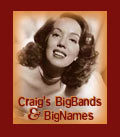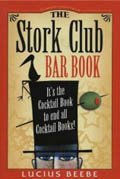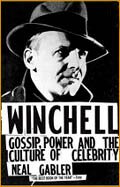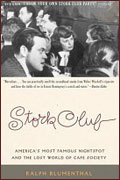Tips on Tables - By Robert W. Dana
He's Paid to Eat
The Job’s Not the Sincere One Might Expect - and Never Bores
"He gets paid to eat, lucky guy!” Thats what they say about anyone who makes his living writing "Tips on Tables" for the New York WorId-TeIegram. The statement implies that all he has to do is walk into a restaurant, order a steak. lick his chops 'before polishing off the prime meat, then gathering a few menus, return to the office and rattle off a column while the stomach assimilates the beef to the symphonic accompaniment of gurgling gastric juices.
Eating out today is no picnic. Restaurants are crowded, service is far below the pre-war level of efficiency and meatless days demand menus whose dishes are poor substitutes for the gastronomic savouries that lend themselves so favorably to word paintings. Then, too, there is no guarantee that the editor won't eat himself into oblivion or at least acquire a case of stomach ulcers.
Editors of "Tips on Tables." following an office policy, have tested the wares of the cat shops without revealing their identity, the idea being that they would receive no special favors or hidden choice cuts but would fare like any other customer. If they found the restaurant worthy of a column, they paid the check, then got the story from the management.
Sometimes, especially when the restaurant is small and probably has no history of Importance, I decide to get the story by stealth. Since a summary called “Menu Memos" is the last paragraph of each "Tips." I Immediately find out how much cocktails are” Next, I have to know what time luncheon and dinner are served, the price range and if the restaurant is open daily.
Chief pitfall for the true technique is the suspicion it arouses in the mind of the waiter. He starts whispering to another and you know they are wondering if you are an OPA inspector. Now, how to get a menu? The thing to do is to sneak one, but it isn’t easy, particularly, if you are self-conscious, and of course you are. So more often, you take the harder way and memorize the dishes and casually ask the waiter about specialties on other days.
Copying menus
Usually though I ask for the person in charge and have a little trouble obtaining menus and other information. There are exceptions of course. The Manager of an Italian restaurant in Mulberry Street willingly showed me through the kitchen and offer details on the preparations of some dishes but you wouldn't part with a menu, so I had to copy it in longhand.
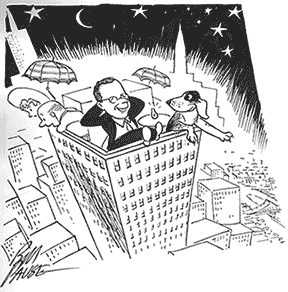
Then there was the restaurant proprietor in Brooklyn, who after answering a few questions and producing the menu, suddenly asked “Where are your credentials?” I thought that a copy of “Tips,” which carried my picture, should be enough identification. Even passes to movie theaters with my name and paper listed, weren't acceptable. The proprietor walked off without saying another word. But the food was good and I wrote a column. P.S. The proprietor to wrote a letter of thanks and apology.
A lot of legwork is required to locate new restaurants that might be subject for a column. Since the column has appeared on an average of five times weekly for a number of years, it is easy to see how difficult it is to keep turning up new eating places of merit. I, also have to use a change of pace and hop back and forth in the range between inexpensive table d’hote restaurants to be expensive a la carte places. And I have to write about the cooking of all nations.
The office and that the job is much more than writing a column. I answer numerous telephone and written requests for information. One young lady wanted to entertain a soldier in a quiet, inexpensive venue with candlelight and exotic food. In desperation I suggested a French bar and grill I had just written about. Two two weeks later the young lady called again to say thanks and tell me that the boy friend proposed after four years.
I don't often have such an opportunity to play Cupid, but I have to be ready each day to direct a reader to the right place. Some aren't quite sure what they want, so I have to be diplomatic. Others want to know where they can have a party, and they never want to spend much.
The mailbag is the best gauge of the column's success. Beside inquiries from readers, I get letters from restaurateurs reporting on the number of persons who came because of a column. A reader will seldom write you that he likes a certain column or group of columns. But just let him be displeased at what he thinks is a bad recommendation and you'll hear from him. For this very reason, I tried to understate rather than overstate my writing. Even then something disagreeable is bound to happen once in a while in the reader book take you to task for not reporting poor service or dirty walls.
Yes, this reporter gets paid to eat. And he must eat and eat and eat. I learned at an early date that keeping a couple of columns ahead is a “must" in this business. One night I had eaten a so-so meal at an inexpensive restaurant. It just wasn't good enough to write about. Not having anything to write about, I had to eat another dinner at another restaurant.
About Robert Dana

Robert W. Dana started his newspaper career In 1934 with the N.Y. Herald-Tribune as secretary in the drama department. For several years he reviewed foreign-language films, particularly German. Was appointed assistant film critic, a position he held four years. At the same time wrote a column, "Dining and Dancing," which he continued until July, 1944. Worked as press agent and then went to the World-Telegram where he writes a daily column. He and his wife, Sara, make their home in Elmhurst, L. I.

Algonquin
Biltmore
Black Angus
Cafe Madrid
Copacabana
Cotillion Room
Eden Roc
Embers
Famous Kitchen
Gage and Tollner's
Glen Island Casino
Jack Delaney's
Jack Dempsey's
LaRue
Latin Quarter
Little Club
Luchow's
Major's Cabin
Marianne et Fils
St. Regis Maisonette
Sea Colony
Stork Club
Three Crowns
Waldorf-Astoria
Zanzibar

Hotels vs. Clubs
Toots Shor's
Two Guitars
WWll Rationing

Contact
Links





